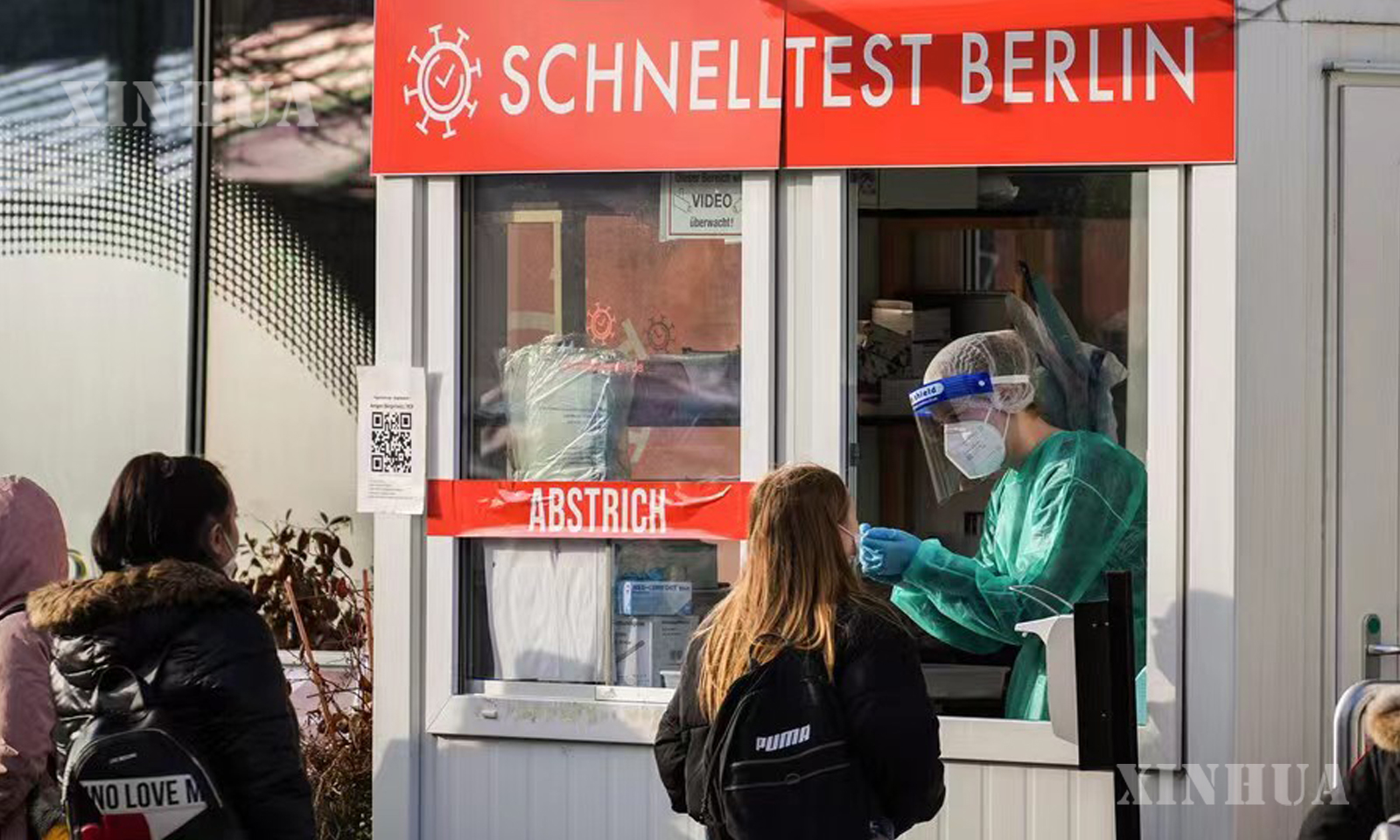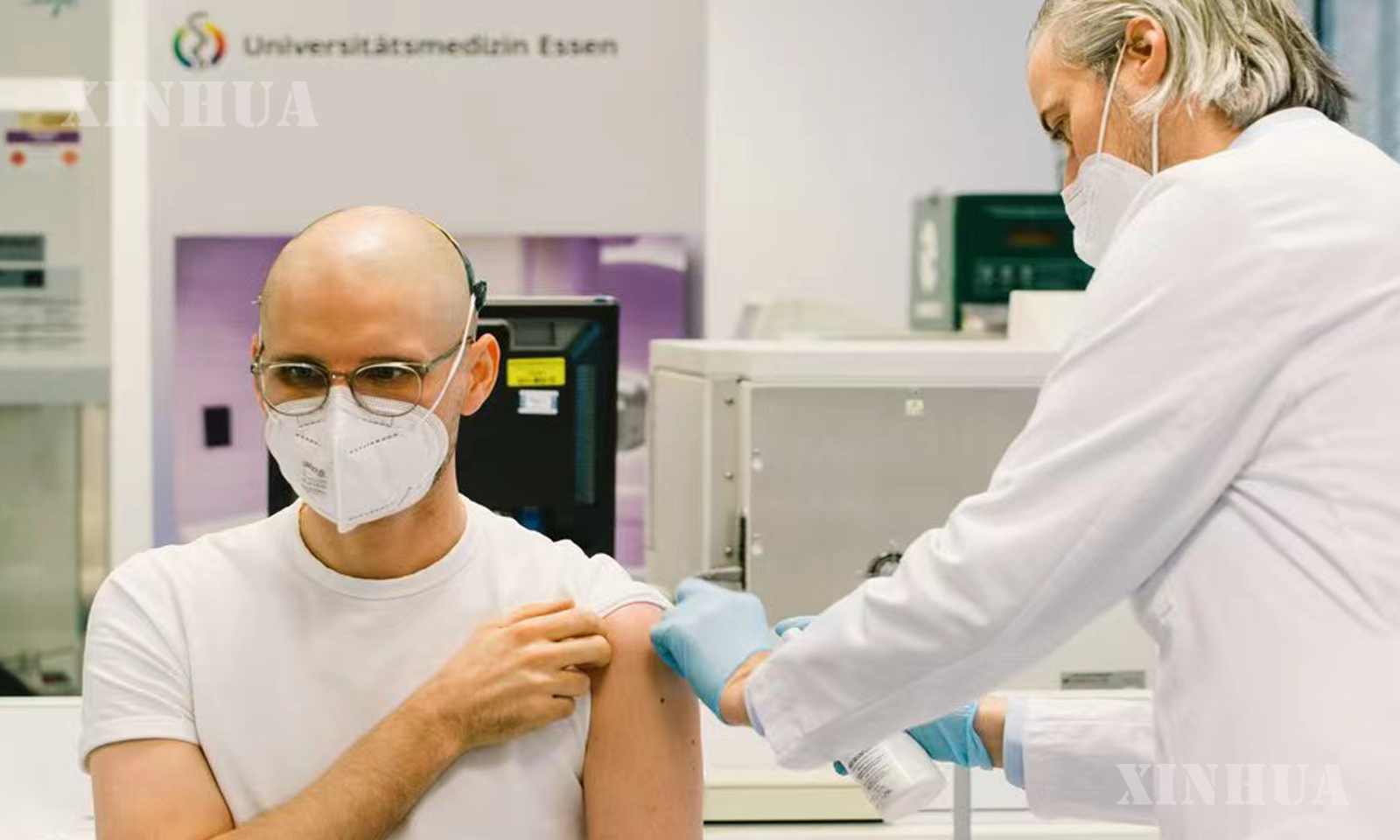Europe
နွေရာသီ COVID-19 လှိုင်းကို ဂျာမနီ ကျန်းမာရေးဝန်ကြီး သတိပေး

ဘာလင်၊ ဇွန် ၁၆ ရက် (ဆင်ဟွာ)
ဂျာမနီနိုင်ငံ ကျန်းမာရေးဝန်ကြီး Karl Lauterbach က လက်ရှိ မြင့်တက်လာသော COVID-19 ရောဂါကူးစက်မှုများအပေါ် စိုးရိမ်မိကြောင်း ဇွန် ၁၅ ရက်၌ ပြောကြားခဲ့ပြီး နွေရာသီလှိုင်း စတင်နေပြီဖြစ်ကြောင်းလည်း သတိပေးခဲ့သည်။

ဂျာမနီနိုင်ငံ မြို့တော် ဘာလင်တွင် COVID-19 ရောဂါစစ်ဆေးပေးသောနေရာ၌ အမျိုးသမီးတစ်ဦးထံမှ တို့ဖတ်နမူနာယူနေသော ကျန်းမာရေးဝန်ထမ်းတစ်ဦးအား ဇန်နဝါရီ ၁၉ ရက်က တွေ့ရစဉ် (ဆင်ဟွာ)

ဂျာမနီနိုင်ငံ Essen မြို့ရှိ Essen တက္ကသိုလ်ဆေးရုံတွင် COVID-19 ကာကွယ်ဆေးထိုးနှံမှုခံယူနေသော ကျန်းမာရေးဝန်ထမ်း (ဝဲ) အား ဇန်နဝါရီ ၁၈ ရက်က တွေ့ရစဉ် (ဆင်ဟွာ)
“နွေရာသီလှိုင်းကြေညာချက်က ကံမကောင်းစွာနဲ့ပဲ အမှန်တကယ်ဖြစ်လာခဲ့ပါပြီ။ ဒါဟာ လာမယ့်သီတင်းပတ်တွေအတွင်း အနည်းငယ် သက်သာရာရသွားတယ်လို့ ဆိုလိုတာပါပဲ” ဟု Lauterbach က Rheinische Post သတင်းစာသို့ ပြောကြားခဲ့သည်။
ဇွန် ၁၅ ရက်၌ နိုင်ငံတစ်ဝန်း နေထိုင်သူ ၁၀၀,၀၀၀ လျှင် ၇ ရက်အတွင်း ၄၇၂.၄ ဦးအထိ မြင့်တက်လာခဲ့ကြောင်း၊ လွန်ခဲ့သောသီတင်းပတ်တစ်ပတ်အကြာကထက် နှစ်ဆနီးပါးမြင့်တက်လာခဲ့ကြောင်း ရောဂါကူးစက်ခြင်းဆိုင်ရာ Robert Koch Institute (RKI) အရ သိရသည်။
ဂျာမနီနိုင်ငံတွင် ဧပြီလမှစ၍ ပထမဆုံးအဖြစ် နေ့စဉ် COVID-19 ရောဂါကူးစက်မှုမှာ ဇွန် ၁၄ ရက်၌ ၁၀၀,၀၀၀ ကျော်သွားခဲ့ခြင်းဖြစ်ကြောင်း RKI က ဆိုသည်။
ထိုသို့ ရောဂါကူးစက်မှုအရေအတွက်အသစ် မြင့်တက်လာခြင်းသည် ကူးစက်မြန် အိုမီခရွန် မျိုးရိုးဗီဇပြောင်းဗိုင်းရပ်စ်များဖြစ်သော BA.5 နှင့် BA.4 ဗိုင်းရပ်စ်နှစ်ခုကြောင့်ဖြစ်သည်။ ဂျာမနီနိုင်ငံတွင် သီတင်းပတ်တစ်ပတ်အတွင်း BA.5 ပျံ့နှံ့မှုသည် ၁၀ ရာခိုင်နှုန်းအထိ နှစ်ဆမြင့်တက်လာခဲ့ကြောင်း RKI ၏ နောက်ဆုံးအပတ်စဉ်သတင်းအရ သိရသည်။
သက်ကြီးရွယ်အိုများနှင့် ရောဂါကူးစက်လွယ်သူများအနေဖြင့် အားဖြည့်ကာကွယ်ဆေးများ ထိုးနှံထားကြရန်၊ ထိုသို့ဆောင်ရွက်ခြင်းဖြင့် အကယ်၍ ရောဂါကူးစက်မှုကို ကာကွယ်ရန် လုံလောက်မှုမရှိပါက ရောဂါလက္ခဏာပြင်းထန်မှုမှ ကာကွယ်ပေးနိုင်ကြောင်း Lauterbach က တိုက်တွန်းခဲ့သည်။
ဂျာမနီနိုင်ငံတွင် အသက် ၁၈ နှစ်နှင့်အထက် အရွယ်ရောက်ပြီးသူ ၆၉.၄ သန်း၏ ၈၅ ရာခိုင်နှုန်းမှာ COVID-19 ရောဂါကာကွယ်ဆေးထိုးနှံပြီးဖြစ်သည်။ ထို့ပြင် ၆၉ ရာခိုင်နှုန်းမှာ အားဖြည့်ကာကွယ်ဆေးတစ်ကြိမ် ထိုးနှံထားပြီးဖြစ်ကြောင်းနှင့် ၇.၈ ရာခိုင်နှုန်းမှာမူ နှစ်ကြိမ်ထိုးနှံထားပြီးဖြစ်ကြောင်း တရားဝင်အချက်အလက်များအရ သိရသည်။
ဂျာမနီနိုင်ငံရှိ COVID-19 ရောဂါကန့်သတ်ချက်အများစုကို ဖြေလျှော့ထားပြီးဖြစ်သည်။ ဂျာမနီနိုင်ငံသည် နွေရာသီလများအတွင်း နောက်ထပ် ဥရောပသမဂ္ဂ (EU) အဖွဲ့ဝင်နိုင်ငံများထံမှ ဝင်ရောက်လာချိန်တွင် ခရီးသွားကန့်သတ်ချက်များကို လျှော့ချပေးခဲ့သည့် နောက်ဆုံး အီးယူအဖွဲ့ဝင်နိုင်ငံများအနက် တစ်နိုင်ငံလည်း ဖြစ်သည်။ (Xinhua)
………………………………
(English Version)
Germany’s health minister warns of COVID-19 summer wave
Source: XinhuaEditor: huaxia2022-06-16 04:28:15
Germany’s health minister warns of COVID-19 summer wave
Source: XinhuaEditor: huaxia2022-06-16 04:28:15
BERLIN, June 15 (Xinhua) — Germany’s Minister of Health Karl Lauterbach expressed his concern Wednesday about the current increase in COVID-19 infections, warning that a summer wave has started.
“The announced summer wave has unfortunately become a reality. This also means little relief for the next few weeks,” Lauterbach told the Rheinische Post newspaper.
The nationwide seven-day incidence rate per 100,000 inhabitants rose to 472.4 on Wednesday, almost twice as high as a week ago, according to the Robert Koch Institute (RKI) for infectious diseases.
For the first time since April, daily COVID-19 infections in Germany exceeded 100,000 on Tuesday, according to the RKI.
The new surge is largely attributed to the two more contagious Omicron subvariants, BA.5 and BA.4. Within a week, the share of BA.5 in Germany doubled to 10 percent, according to the RKI’s latest weekly report.
Lauterbach encouraged the elderly and vulnerable people to take booster vaccinations, which can prevent severe symptoms even if they do not necessarily prevent infections.
Of the 69.4 million adults in Germany aged 18 and above, around 85 percent are vaccinated against COVID-19. More than 69 percent have received one booster shot while 7.8 percent already received two, according to official figures.
Most COVID-19 restrictions in Germany have been lifted. It was one of the last countries in the European Union (EU) to drop travel restrictions when entering from another EU member state for the summer months. ■
Photo 1 : Passengers wearing face masks are seen on a bus in Berlin, capital of Germany, April 1, 2022. (Photo by Stefan Zeitz/Xinhua)
Photo 2 : A medical worker collects a swab from a woman at a COVID-19 test station in Berlin, Germany, on Jan. 19, 2022. (Photo by Stefan Zeitz/Xinhua)
Photo 3 : A medical worker (L) receives a COVID-19 vaccine at the University hospital of Essen in Essen, Germany, Jan. 18, 2021.






